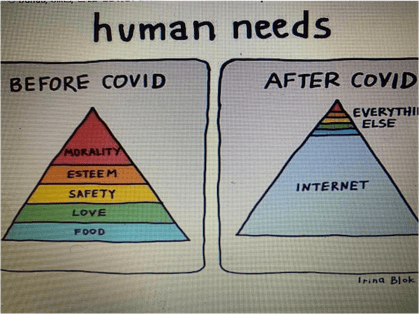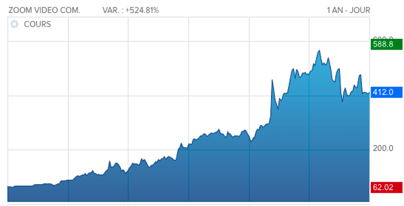Catalyst for Digital Transformation: How Covid-19 Redefined Connectivity
When the second lockdown was announced, a friend sent me the following drawing on Whatsapp. I already knew of a number of diversions of the Maslow pyramid which place WiFi at the level of physiological needs. Here, we talk about the Internet and “everything else” as if everything else was trivial. Caricatural of course, even if life with Covid-19 has revealed the essential role of WiFi in our daily lives. I still wonder if this perception of the Internet “first” is simply linked to the impacts of the crisis on our personal and professional life in 2020 or if it is for the long term? In both cases, B2B internet service providers clearly have a role to play.

All digital, common points of all “covid values” ?
Since the health crisis brought about the shutdown of entire sectors of the economy, some digital companies have nevertheless seen their stock market prices explode in 2020... Until November 9th, the day they announced the first Covid-19 vaccine was approved. As if the companies' model was based only on containment measures across the world!
 Evolution of the Zoom stock market price December 2019 - December 2020
Evolution of the Zoom stock market price December 2019 - December 2020
If the announcement effect has impacted their stock prices, these companies still remain the big winners of 2020: because their valuations have largely exceeded their real profits and especially because if social distancing and containment measures have accelerated their growth, they are still part of a long-term trend: the profound transformation of the use of the internet and the generalisation of all things digital. Overview of the annual growth of certain stocks between December 9, 2019 and December 9, 2020:
- Netflix: $ 296 to $ 512 (peak at $ 575)
- Zoom: $ 64 to $ 412 (peak at $ 588)
- Amazon: $ 1748 to $ 3177 (peak at $ 3550)
- Teladoc Health (telemedicine): $ 75 to $ 198 (peak at $ 253)
- Shopify: $ 305 to $ 1103 (peak at $ 1144)
Indeed, these companies both B2B and B2C offer services that depend on the internet. But not just any internet. An internet that really works, everywhere, all the time.
“Digital transformation” is a term that has been democratised for several years now, but it must be recognised that the containment measures linked to the health crisis have been a spectacular accelerator of digitisation. The global SaaS market is booming, there are no longer any innovations and applications hosted in the cloud that allow entertainment but above all to better communicate, collaborate and of course gain in productivity.
Is the digitisation of society an opportunity for B2B operators?
It's hard to say otherwise. But right now I prefer to talk about responsibility rather than opportunity. That of ensuring the best possible connectivity for our customers, that of helping companies in our own way in this very difficult context, that of building a technical base that will be able to accommodate the digital uses of today and tomorrow.
A fairly noticeable turning point is underway. The companies that reach out to us no longer just ask for information about our services but "for help", which reflects the essential nature of our activity.
If we look back at our responsibility as a B2B operator in 2020, the sectoral variety of our customers means that we have had to adapt to very different situations:
- Student residences: in November, residences were fourth fifths occupied, by and yet we noted an increase in traffic compared to November 2019 (+ 18%). The criticality of internet access for students (distance courses and exams) has pushed us to go above and beyond to rapidly increase speeds and strengthen our vigilance on network performance.
- Care homes: the devastating effects of isolation have been amplified by the prohibition and restriction of visits from relatives. We have mobilised our teams to offer record deployment times to provide WiFi services as quickly as possible.
- Hotel and tourism: we have, within the limits of our financial capacities, set up lifelines for customers who need them the most. We also advise them on the strategies they should implement to facilitate the return of customers with this new reality.
- Retail and companies: mobility is at the heart of new workspaces and companies must rethink their real estate spaces according to the increasing nomadism of employees. We make them aware of the importance of an enterprise WiFi architecture adapted to these new uses. On the retail side, we can see that we are far from 100% e-commerce and that implementing in-store connectivity has become essential. This year, we are supporting a major player in mass distribution in the digitisation of its points of sale, addressing both business needs and issues related to the customer journey.
A journalist recently asked me why all these professionals call on Wifirst, it seemed more natural to him to contact the historical operators such as BT or Virgin Media - who know how to do everything.
Because they are generalists and we are specialists. WiFi is a discipline that requires support from a specialist. How does this translate into practice?
- We focus all our R&D forces on the design and operability of WiFi networks.
- We capitalise on our experience (18 years of WiFi, 200K WiFi access points managed in real-time).
- We are fully committed to the benefits that a scalable, high-performance and multiservice WiFi service can bring to our customers.
- We are the pioneers of the “as a service” model: taking full responsibility for the quality of service, allowing our customers to focus on what is essential: their core business.
Unlike some things in this world, working with a specialist doesn’t have to be expensive! Wifirst's organisational structure allows us to be systematically more competitive than generalist operators while responding to our customers' issues with highly innovative and tailor-made solutions!
- Wifi (43)
- Hotel Industry (18)
- Digital Workplace (14)
- Behind the scenes (8)
- IPTV - Signage (8)
- Optical fibre (7)
- Green-IT (5)
- Retail (5)
- Education (3)
- Healthcare (2)
- Cybersecurity (1)
- General (1)
- Hospitality (1)
- PBSA (1)
- Student Accommodation (1)
- Telephony (1)
- Tips and tricks (1)
- Tourism (1)
- Wifirst (1)
You May Also Like
These Related Stories

The benefits of IP video surveillance

Understanding the Essentials of Service Level Agreements (SLAs)
